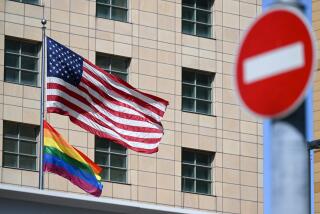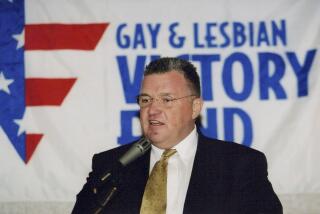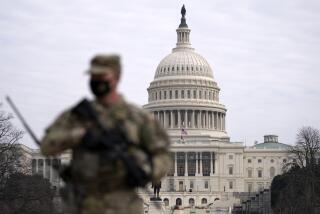Tune is changing on gays in military
When Bill Clinton proposed dropping the ban on gays and lesbians serving openly in the military, Army Gen. Colin L. Powell, then the chairman of the Joint Chiefs of Staff, was vehement in his opposition.
“The presence of homosexuals in the force would be detrimental to good order and discipline for a variety of reasons, principally relating around the issue of privacy,” Powell said in a January 1993 speech at the U.S. Naval Academy, just days before Clinton took the oath of office.
Last month, the incoming Joint Chiefs chairman had a much more nuanced response when asked about the ban during his confirmation hearing. Navy Adm. Michael G. Mullen said that though he supported the current policy, he was open to having Congress debate whether it was still appropriate. “I’d love to have Congress make its own decision with respect to that,” Mullen said.
Subtly but unmistakably, rhetoric from the military and Congress has begun to soften on the controversial policy known as “don’t ask, don’t tell.” Powell himself has changed his tune, acknowledging that attitudes have shifted. A House bill that would lift the ban on gays serving openly has gained support from military veterans in that chamber. And the pressures of the Iraq war and the 2008 presidential campaign have focused more attention on the merits of a repeal.
At a forum tonight for Democratic presidential candidates, the ban is expected to get its most thorough examination since 1993. The event, cosponsored by the Human Rights Campaign, a gay rights organization, will be held in front of about 200 invited guests at a Hollywood video production facility.
In a previous debate, the eight Democratic hopefuls all raised their hands to acknowledge they would work toward lifting the ban. Tonight, they will probably get an opportunity to expand on that.
In surveys filled out ahead of tonight’s forum, the leading candidates showed a depth of commitment to the repeal that could push the issue back into the limelight.
“Courage, honor, patriotism and sacrifice -- the traits that define our men and women in uniform -- have nothing to do with sexual orientation. This is a matter of national security, and I will fix it, “ wrote Sen. Hillary Rodham Clinton of New York, the Democratic front-runner. Sen. Barack Obama of Illinois and former Sen. John Edwards of North Carolina wrote similar statements.
Activists and veterans said the attitude shift among policymakers was partly because of high-profile incidents during the Iraq war in which service members holding key jobs, particularly Arabic translators, were dismissed because of their sexual orientation. Activist groups said at least 59 such cases had been documented.
In addition, recent comments by the outgoing Joint Chiefs chairman, Marine Gen. Peter Pace, that allowing gays to serve openly in the military would be condoning “immoral behavior,” set off a firestorm that has convinced even some centrist Republicans that the issue should be reevaluated.
“Gen. Pace’s comments were fortunate in that they caused people to think about the current policy,” Sen. Susan Collins (R-Maine) said in an interview, adding that she would support a reexamination of the ban.
Perhaps most significant, recent polling data have shown that a new generation of service members, raised in an era in which homosexuality was more accepted, is more willing to serve with openly gay recruits.
“Just like in the general population, there is a generational shift within the military,” said Paul Rieckhoff, a former Army platoon commander in Iraq who is now executive director of Iraq and Afghanistan Veterans of America, a group largely composed of younger retired soldiers. “The average 18-year-old has been around gay people, has seen gay people in popular culture, and they’re not this boogeyman in the same way they were to Pete Pace’s generation.”
In a Zogby International survey conducted in October of 545 service members who served in Iraq or Afghanistan, 37% said they were opposed to allowing gays to serve openly in the military. Nineteen percent said they were uncomfortable in the presence of gays and lesbians.
Steve Ralls, communications director of the Servicemembers Legal Defense Network, a nonprofit that provides legal assistance to military personnel affected by the “don’t ask, don’t tell” policy, said the organization knew of at least 500 active-duty military personnel who were serving openly, without retribution from their comrades.
Even Powell has had a change of heart. In June, he told NBC’s “Meet the Press” that his attitudes had shifted significantly since 1993 -- though he stopped short of calling for a repeal of the ban, a position recently taken by his immediate successor, Army Gen. John M. Shalikashvili.
Despite the change in attitudes, ending the ban will probably be more difficult than creating it was in 1993. As part of the compromise reached by the Clinton administration, the ban on gays and lesbians serving openly -- once just a Pentagon rule -- was encoded in U.S. law, meaning that unless a court strikes it down, legislation would have to be passed to repeal it.
Even with a Democratic president, such a proposal may have a difficult road -- particularly in the Senate, where advocates of repeal would probably need a filibuster-proof supermajority to pass a new law.
Ralls said he believed there was an increasing number of moderate Republican senators such as Collins and John W. Warner of Virginia -- a leading GOP voice on military issues who strongly rebuked Pace’s remarks on gays in the military -- who support revisiting the issue.
“There are moderate Republicans in Congress who are beginning to understand that ‘don’t ask, don’t tell’ is very much a national security issue,” Ralls said. “Many of those same Republicans are beginning to question the wisdom of dismissing and turning away perfectly well-qualified gays and lesbians who want to serve.”
So far, no legislation that would lift the ban exists in the Senate, but a House bill has been slowly gaining support. Last week, it gained an important cosponsor in Rep. Joe Sestak (D-Pa.), a retired Navy vice admiral.
In an interview, Sestak said he was persuaded to support lifting the ban in part by witnessing the integration of women on ships when he commanded an aircraft carrier group. There were similar concerns about privacy and unit cohesion before women assumed front-line roles, but most of those fears proved unwarranted, Sestak said.
“I went to war with a number of individuals that were gay -- we knew that because the statistics show that we have a certain percentage that were gay,” he said. “How can I come back here to the United States and then say they don’t deserve equal rights after they served our nation in war?”
For its part, the Pentagon insisted that there had been no change in how it executes the policy, despite the heavy war-related demand to retain troops. A spokesman for Lt. Gen. Michael D. Rochelle, the Army officer in charge of personnel issues, said the service had not done any contingency planning in case the ban is lifted. In the past, concerns about such issues as common showers and inappropriate conduct have been raised.
--
joel.rubin@latimes.com
Spiegel reported from Washington and Rubin from Los Angeles.
--
Democratic forum
The Democratic presidential forum at the Production Group Studios in Hollywood will be broadcast live on the Logo cable/satellite network tonight at 6. It will also stream live at www.logoonline.com.
More to Read
Get the L.A. Times Politics newsletter
Deeply reported insights into legislation, politics and policy from Sacramento, Washington and beyond. In your inbox three times per week.
You may occasionally receive promotional content from the Los Angeles Times.







